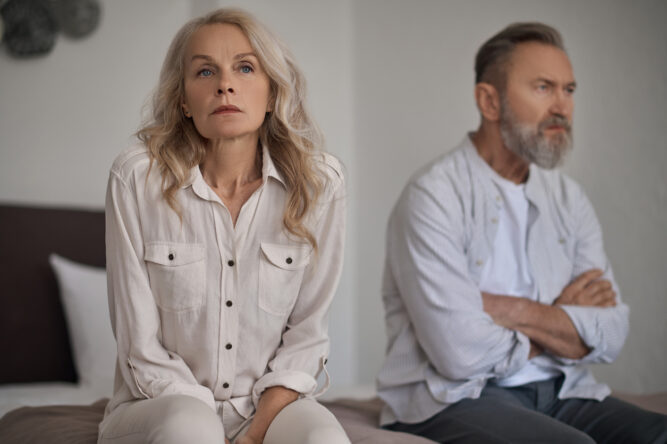There’s a particular kind of exhaustion that comes from constantly having to explain basic realities to people who don’t experience them.

For many women, that means spending years politely justifying things that should really be common sense by now—whether it’s why something feels unsafe, why a joke isn’t funny, or why they’re just tired of being interrupted. Most women aren’t asking for applause. They’re asking for people to listen, believe them the first time, and stop acting like their experiences are up for debate.
1. Feeling unsafe isn’t the same as being dramatic.

If a woman says something makes her uncomfortable, like walking alone at night or being followed on public transport, she isn’t overreacting. She’s lived her whole life with reasons to be cautious. Men might not notice the same things because they don’t have to, but that doesn’t mean those concerns are irrational. When women flag safety issues, they’re asking for understanding—not a lecture on how “nothing’s actually going to happen.”
2. “No” doesn’t mean “convince me.”

If a woman says no—to a date, to a favour, to a conversation—she doesn’t owe an explanation. It’s not an invitation for persuasion, or a challenge to work harder for a yes. Women are tired of having to say no multiple times, in softer ways, just to be taken seriously. Boundaries don’t need justifying. They need to be respected.
3. Period pain can be genuinely debilitating.

It’s not just “a bit of cramping.” For some women, it’s days of fatigue, nausea, back pain, and intense discomfort. And they still show up to work, school, or life like nothing’s happening. When they say they’re not feeling 100%, they’re not looking for pity. They’re hoping to be believed, not brushed off with a joke about mood swings.
4. Being interrupted constantly isn’t a coincidence.

It happens in meetings, in conversations, even in casual chats. A woman starts speaking, and suddenly, someone’s jumping in or explaining the same thing she just said, louder. It’s not about ego—it’s about space. Women often have to fight to finish a sentence without being talked over, and they notice when it happens. Trust that.
5. Compliments aren’t always welcome.

Being told to “take it as a compliment” doesn’t change how invasive or unsettling it can feel. Especially when it’s coming from a stranger, in a setting where walking away doesn’t feel safe. It’s not that women hate compliments—it’s that they can often feel like a power move, not kindness. The context matters. So does tone—and so does whether it was ever invited.
6. “Smiling more” isn’t going to fix anything.

Being told to smile isn’t a neutral comment. It implies that women exist to look pleasant, and that their default expression is up for public correction. It’s a small, everyday reminder that women are expected to manage other people’s feelings, even at the expense of their own. That’s not harmless; it’s tiring.
7. Clothes aren’t “asking for it.”

What a woman wears is not a statement about her consent, her morals, or her availability. It’s just clothing. Sometimes it’s for fashion, sometimes comfort, sometimes nothing more than weather-appropriate survival. Women are constantly having to defend their outfits as if they’re responsible for how others behave. They’re not, and they shouldn’t have to keep repeating that.
8. Just because something hasn’t happened to you doesn’t mean it’s not real.

When women talk about harassment, discrimination, or microaggressions, the worst response is “Well, I’ve never seen that happen.” It shuts down the conversation and implies they’re exaggerating. The fact that you haven’t noticed it doesn’t mean it didn’t happen. It probably just means you weren’t the one living it.
9. Being direct doesn’t make a woman rude.
 Source: Unsplash
Source: Unsplash When a woman is assertive, clear, or confident, it’s often labelled as aggressive or unfriendly. However, if a man says the same thing in the same tone, it’s seen as strong leadership. Women are tired of having to “soften” everything to make it palatable. Being clear isn’t a character flaw. It’s a communication skill.
10. Helping out doesn’t make you a hero.

Sharing the mental load, doing household chores, or being a present parent isn’t a favour—it’s the bare minimum in an equal relationship. Women are tired of seeing basic decency treated like a bonus. Appreciation is one thing. Expecting praise every time you put the bins out is another. Real equality means shared responsibility, not applause for doing your part.
11. Sexual harassment isn’t always obvious.

It’s not just physical. It’s the comments, the looks, the lingering presence, the forced closeness, the inappropriate texts. And it doesn’t have to be “that bad” to still be wrong. Women are constantly calculating what’s safe to say, when to say it, and whether reporting it will even be taken seriously. It’s exhausting having to keep proving that their discomfort is valid.
12. Emotional labour is real.

Remembering birthdays, smoothing over family drama, keeping the peace, checking in when someone’s off—this invisible work often falls on women, and it’s not accidental. They’re not being overly sensitive when they ask for balance. They’re recognising the hours of effort that go unacknowledged, even though they hold everything together.
13. Not wanting kids isn’t selfish or strange.

Women who choose not to have children don’t owe anyone an explanation. It’s not a phase. It’s not something they’ll “grow out of.” It’s a personal decision, not a flaw in their character. And yet, they still get grilled at dinner tables and second-guessed in relationships, as if they’re missing some fundamental piece of themselves. They’re not. They’ve just made a different choice.
14. Being single isn’t a problem to fix.

A woman’s value isn’t tied to her relationship status. Being single doesn’t mean she’s unhappy, difficult, or incomplete—it means she’s living life on her terms right now. Women are tired of hearing “you’ll find someone” every time they express contentment. Some are looking for love. Some aren’t. Either way, it’s nobody else’s job to define what’s missing.
15. “I was just joking” isn’t a free pass.

Humour isn’t a shield from accountability. If a joke is sexist, demeaning, or based on tired stereotypes, it doesn’t stop being problematic just because it’s framed as funny. Women shouldn’t have to be the ones always explaining why something hit wrong. If people keep laughing at someone else’s expense, it’s probably not harmless.
16. Taking up space doesn’t mean being attention-seeking.

When women speak up, advocate for themselves, or share their opinions confidently, they’re often accused of being loud or difficult. Meanwhile, that same energy is praised in men. Women are done shrinking themselves to keep others comfortable. Taking up space doesn’t mean they’re trying to dominate—it means they’re done disappearing.
17. “Not all men” isn’t the point.

When women talk about their experiences with sexism or fear, they’re not accusing every man. They’re highlighting patterns that many women face on a daily basis. Jumping in with “not all men” derails the conversation and centres male discomfort instead of women’s reality. It’s not about blame; it’s about understanding.
18. Politeness isn’t consent.

Just because a woman is friendly or polite doesn’t mean she’s interested. Many women are trained to be kind in uncomfortable situations because it feels safer than being honest. Reading too much into basic friendliness isn’t flattering—it’s unsettling. Women shouldn’t have to choose between being nice and being safe.
19. Trauma doesn’t need to look a certain way.

Not every woman who’s been through something hard looks fragile or broken. They might laugh, succeed, carry on like everything’s fine. That doesn’t mean they’re untouched by it. Assuming someone’s “too put-together” to have struggled is dismissive. Women are tired of explaining that healing and high-functioning aren’t mutually exclusive.
20. Listening matters more than defending yourself.

When a woman shares how something affected her, the goal isn’t to accuse—it’s to be heard. Jumping straight into “but I didn’t mean it like that” misses the point entirely. Women don’t want every conversation to become a courtroom. Sometimes, they just want you to stop talking, sit with what they said, and genuinely try to understand it. That’s all.




